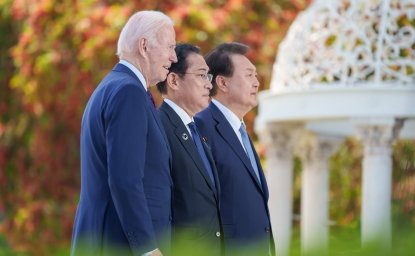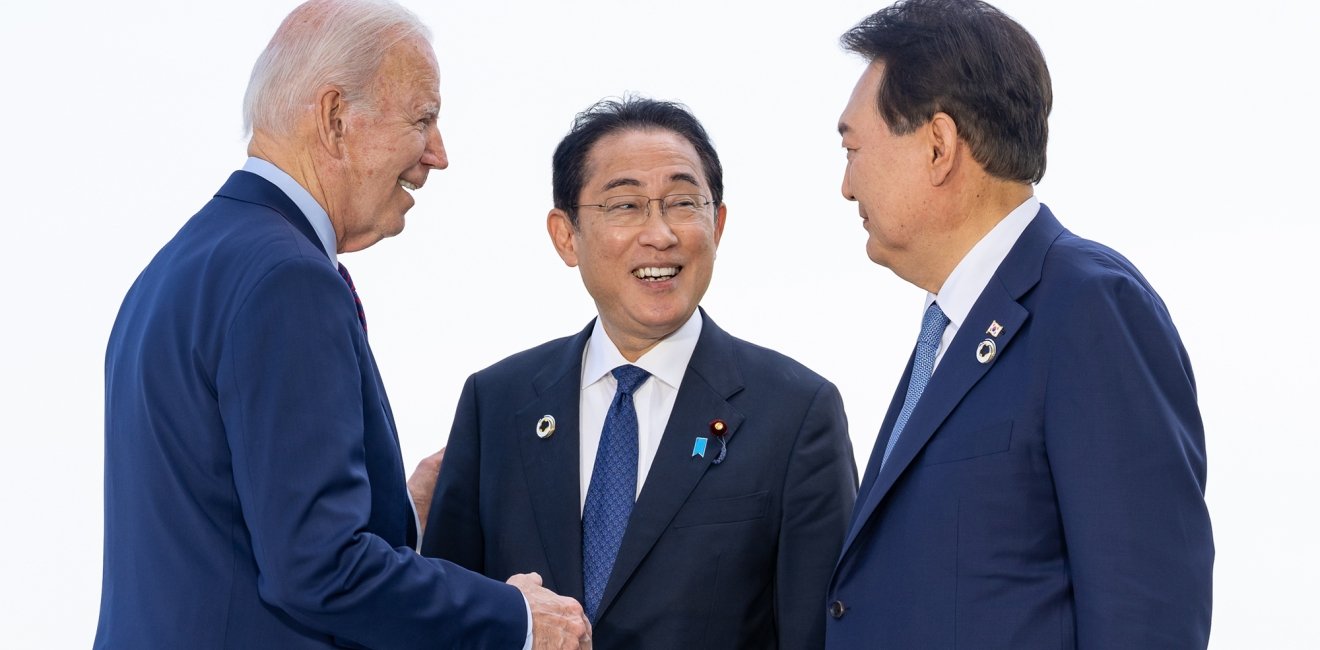On August 18, the leaders of the United States, South Korea, and Japan will meet at Camp David near Washington, D.C. for an unprecedented historical summit.
While North Korea and the rising security threat it poses to East Asia will be high on the security agenda, outcomes from the summit will likely include the three countries’ aims to strengthen trilateral cooperation on non-traditional security goals in supply chain resiliency, critical technologies, and energy security.
As the three leaders are poised to take the stage, the intermingling of domestic and international politics complicates the scene. Careful attention will need to be paid to lock-in a long-term and sustainable trilateral agenda acceptable to all three countries.
Building Diplomatic Momentum
The summit at Camp David follows on the heels of a concatenation of bilateral engagement between the United States and two of its closest allies in the Indo-Pacific: South Korea and Japan.
This year witnessed poignant diplomatic summitry among the three countries. Celebrating the 70th year of the US-ROK military alliance, US President Joe Biden hosted ROK President Yoon Suk Yeol at the White House for a highly successful State Visit and Presidential Summit—Complete with the cultural exchange of “American Pie” sing-along at the state dinner. During the 2023 US-ROK presidential summit—the second of Biden’s presidency—the two presidents reemphasized their strong bilateral ties, which move beyond the US-ROK military alliance into new frontiers of a shared ‘global comprehensive strategic alliance,’ centering on economic partnership and energy cooperation.
Quickly following, Biden and Japanese Prime Minister Fumio Kishida met the ahead of the G7 Summit in Hiroshima, Japan. Building upon Biden-Kishida’s January 2023 summit, in May U.S. and Japanese leaders also reaffirmed the two countries’ commitments to defense cooperation and expansion of economic security relations.
However, South Korea and Japan’s historical difficulties and low domestic approval ratings in both countries indicate that there is yet work to be done.
Difficulties at Home (Current and Historic)
The invitation to the U.S. presidential retreat in Maryland comes at a crucial time as political ties perceptively defrost between South Korea and Japan. After inauguration last year, Yoon put forth diplomatic efforts—including a proposed solution to compensate victims of forced labor under the Japanese occupation period (1905-1945)—to broker ‘future-oriented’ engagement with Japan. In a reciprocal turn, Kishida invited Yoon to Japan for the first ROK-Japan presidential summit in 12 years, where both leaders vowed to reestablish ‘shuttle diplomacy’ (i.e. reciprocal visits) moving forward.
While internationally applauded, the pivotal thaw of ROK-Japan relations has been seen as a potentially risky political gamble as both leaders have received backlash from constituents and domestic opponents alike. Coupled with recent political scandals, these bilateral reconciliation efforts have left Yoon and Kishida with dismally low approval ratings—Risky for two leaders in the early years of their leadership.
Camp David will be a much-needed opportunity to reaffirm the ROK-Japan bilateral partnership on the international stage and—if defined succinctly with an eye toward sustainable policy— to push forward a foundational agenda for the US-ROK-Japan trilateral relations.
The bilateral relationship between South Korea and Japan requires strengthening, and US efforts to reenforce the trilateral partnership are strong and apparent.
Pathways Forward
Despite these difficulties, there are clear areas for current and future trilateral cooperation. The bilateral relationship between South Korea and Japan requires strengthening, and US efforts to reenforce the trilateral partnership are strong and apparent.
Currently, several fronts within the multidimensional US-ROK-Japan trilateral partnership coincide with areas where the three countries see eye-to-eye. Moving forward, the highest areas of concordance for enhanced trilateral cooperation are defense, economic security, and energy transition.
Defense Cooperation
Amid rising geostrategic security threats, the United States can not afford a divided Indo-Pacific policy. Strong ROK-Japan relations are paramount for ensuring robust US Asia policy. Defense cooperation has long been a cornerstone of the United States relationships with South Korea and Japan—the US two greatest allies and strategic linchpins in East Asia.
Seeking peace and stability in the region, both South Korea and Japan look to US support to address security challenges such as North Korea’s ongoing nuclear weapon and ballistic missile programs. Recent ramp-up and diversification of North Korea’s threat capabilities and last September’s nuclear policy law have re-sparked conversations around US extended deterrence in Japan and on the Korean Peninsula. In continuation of US policy, Camp David will serve as a method of reassure of US commitment to defense cooperation and extend deterrence.
Economic Security
As global tensions rise, the United States, South Korea, and Japan are collectively committed to a free and open Indo-Pacific, though faced with similar economic security challenges in safeguarding diverse, resilient supplies chains and securing critical technology and infrastructure development. The Biden administration’s Indo-Pacific Economic Framework (IPEF) successful induces strong buy-in from regional allies, including active participation from Japan and South Korea which recently hosted the Fourth IPEF Negotiating Round in July.
However, recent US trade and supply chain policies hold both promises and pitfalls for trilateral engagement. Multilateral cooperation has been difficult to balance against domestic priorities as questions remain around the implementation of the US Inflation Reduction Act (IRA) and CHIPS Act acutely demonstrate. Clear guidelines and careful consideration of US economic policy impacts on regional allies are crucial—especially for South Korea and Japan, Asia’s two largest democratic economies—to ensuring proactive and productive economic cooperation among the three countries.
Energy Transition
A clear area of potential trilateral cooperation are climate action and energy security. The 21st century has brought record-breaking temperatures and environmental disasters. Moreover, geopolitical disruptions such as Russia’s unlawful incursion into Ukraine has created energy insecurity, which while mainly felt across Europe has not left East Asia unshaken.
As three of the world’s largest carbon-emitters, trilateral cooperation among the United States, South Korea, and Japan presents an opportunity for combined leadership ahead of the UN Climate Change Conference, COP 28 set for late 2023.
An announcement of combined US-ROK-Japan trilateral cooperation on climate and energy security would be a relatively easy next step for the tripartite relationship.
Currently, the US serves as a bilateral pillar fostering climate and energy discussions with South Korea and Japan. The inaugural US-Japan bilateral Energy Security Dialogue last December and the long-standing US-ROK Energy Security Dialogue most recently held in March serve as key examples of bilateral channels. Repeatedly emphasized in bilateral summit meetings, the three countries are keen to explore clean and secure energy development, discussing areas of interest in renewable energy, nuclear energy cooperation, hydrogen economy, and power trade market reforms.
An announcement of combined US-ROK-Japan trilateral cooperation on climate and energy security would be a relatively easy next step for the tripartite relationship.
As the Camp David summit approaches, careful consideration should be paid to which policy areas will nudge and sustain the current momentum of US-ROK-Japan trilateral cooperation forward.
More than summitry optics and personality politics, the three leaders should seek avenues of cooperation that will preserve future trilateral engagement beyond the turning points of leadership transition—Difficult but, above all else, the most important task.
Author


Hyundai Motor-Korea Foundation Center for Korean History and Public Policy
The Center for Korean History and Public Policy was established in 2015 with the generous support of the Hyundai Motor Company and the Korea Foundation to provide a coherent, long-term platform for improving historical understanding of Korea and informing the public policy debate on the Korean peninsula in the United States and beyond. Read more


Indo-Pacific Program
The Indo-Pacific Program promotes policy debate and intellectual discussions on US interests in the Asia-Pacific as well as political, economic, security, and social issues relating to the world’s most populous and economically dynamic region. Read more

Explore More
Browse Insights & Analysis
Can Camp David Pave the Way for Durable Japan-Korea Ties?

360° View of How Southeast Asia Can Attract More FDI in Chips and AI




